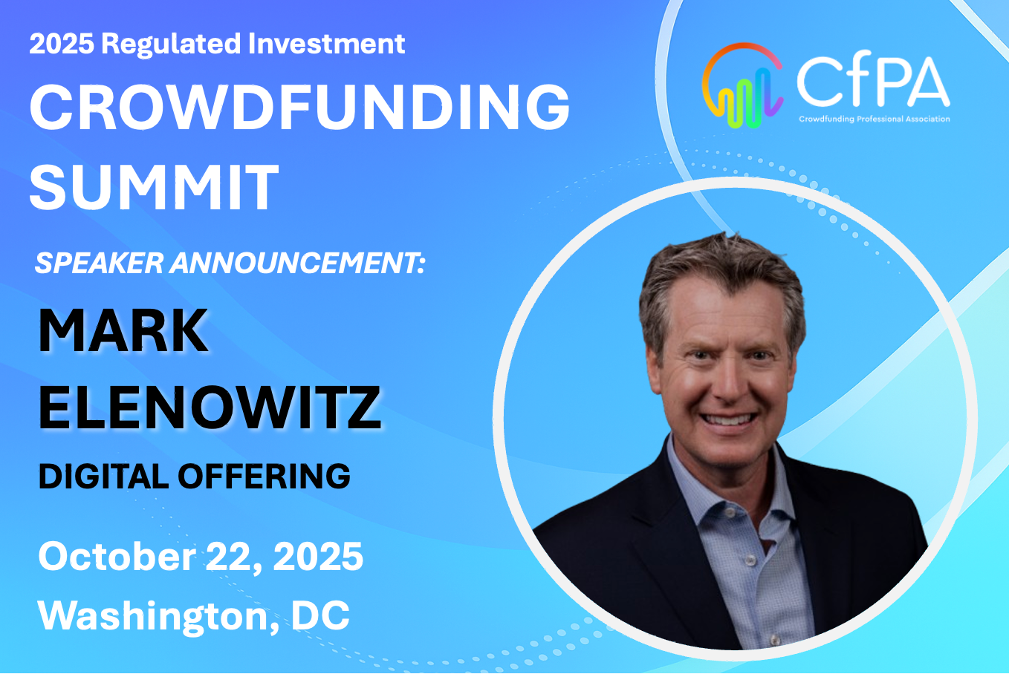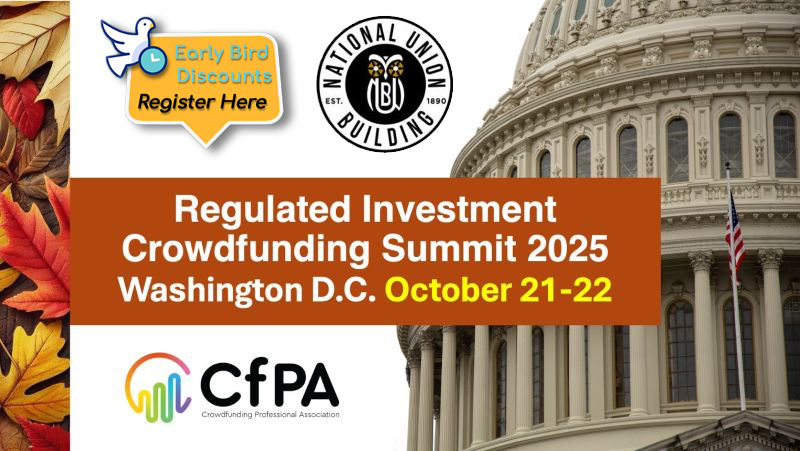Crowdfunding ECO Town Hall Ask to Join
Register and request to join to see more.

Join Mark Elenowitz at the 2025 Regulated Investment Crowdfunding Summit
Did you know that Mark Elenowitz's firm played a key role in one of the hottest public offerings of 2025 -- that of Newsmax? What many people don’t realize is that Newsmax used Regulation A Crowdfunding as part of its journey to going public. Join us at the CfPA’s 2025 Regulated Investment Crowdfunding Summit in Washington, DC, on October 22 to learn more about alternative pathways to the public markets - and to hear directly from Mark Elenowitz on how it all came together. Summit space is limited so register today: https://events.humanitix.com/regulated-investment-crowdfunding-summit-2025

Register Now — Super Early Bird Pricing Ends Soon!
Registration is Now Open!
Join us for the highly anticipated 2025 Regulated Investment Crowdfunding Summit
📅 October 21–22, 2025
📍 Washington, DC
Get ready for two powerful days at the center of innovation in the Reg CF and Reg A space! Meet changemakers from across the public and private sectors — including industry leaders, forward-thinking regulators, and policy influencers. Discover fresh ideas, powerful insights, and real-world strategies shaping the future of regulated investment crowdfunding. From big-picture policy discussions to practical strategies, this event will equip you to thrive in today’s fast-evolving crowdfunding landscape.
Register Now — Super Early Bird Pricing Ends Soon!
Secure your spot at the best rate before prices increase: Register Here
More details coming soon—but don’t wait!
Day 1 – October 21: Advocacy Visits — on Capitol Hill and with key regulators
Day 2 – October 22: Full-Day Conference at the National Union Building
Interested in Sponsoring?
Explore our sponsorship opportunities and get your brand in front of the industry’s most influential voices: https://docsend.com/view/hh5fjwfkdee3d9m4
Let’s shape the future of regulated investment crowdfunding — together.

Advocating for Unified Regulation of Digital Assets
Hello,
We’ve sent a letter to key Congressional staffers on the House Financial Services Committee urging them not to create a separate regulatory lane for digital assets. We believe consistent, principles-based regulation is essential for protecting investors and ensuring fair, efficient markets.
Here is the letter: https://drive.google.com/file/d/1AI5cn_9hi0wDeQNV85KJ5M-3QP_Vy4bl/view?usp=drive_link

Our Response to Commissioner Peirce on Crypto Public Offerings
We’ve submitted a letter in response to Commissioner Peirce’s statement, “There Must Be Some Way Out of Here,” addressing Questions 7–9 related to Public Offerings of Digital Assets.
Our comments emphasize the importance of regulatory clarity and a path forward that supports innovation while protecting investors.
Here is the letter: https://drive.google.com/file/d/1kn4HjBxeIRjty1zfqxr47PMmjCC1-JLW/view?usp=drive_link

Register Now — Super Early Bird Pricing Ends Soon!
Registration is Now Open!
Join us for the highly anticipated 2025 Regulated Investment Crowdfunding Summit
📅 October 21–22, 2025
📍 Washington, DC
Get ready for two powerful days at the center of innovation in the Reg CF and Reg A space! Meet changemakers from across the public and private sectors — including industry leaders, forward-thinking regulators, and policy influencers. Discover fresh ideas, powerful insights, and real-world strategies shaping the future of regulated investment crowdfunding. From big-picture policy discussions to practical strategies, this event will equip you to thrive in today’s fast-evolving crowdfunding landscape.
Register Now — Super Early Bird Pricing Ends Soon!
Secure your spot at the best rate before prices increase: Register Here
More details coming soon—but don’t wait!
Day 1 – October 21: Advocacy Visits — on Capitol Hill and with key regulators
Day 2 – October 22: Full-Day Conference at the National Union Building
Interested in Sponsoring?
Explore our sponsorship opportunities and get your brand in front of the industry’s most influential voices: https://docsend.com/view/hh5fjwfkdee3d9m4
Let’s shape the future of regulated investment crowdfunding — together.



